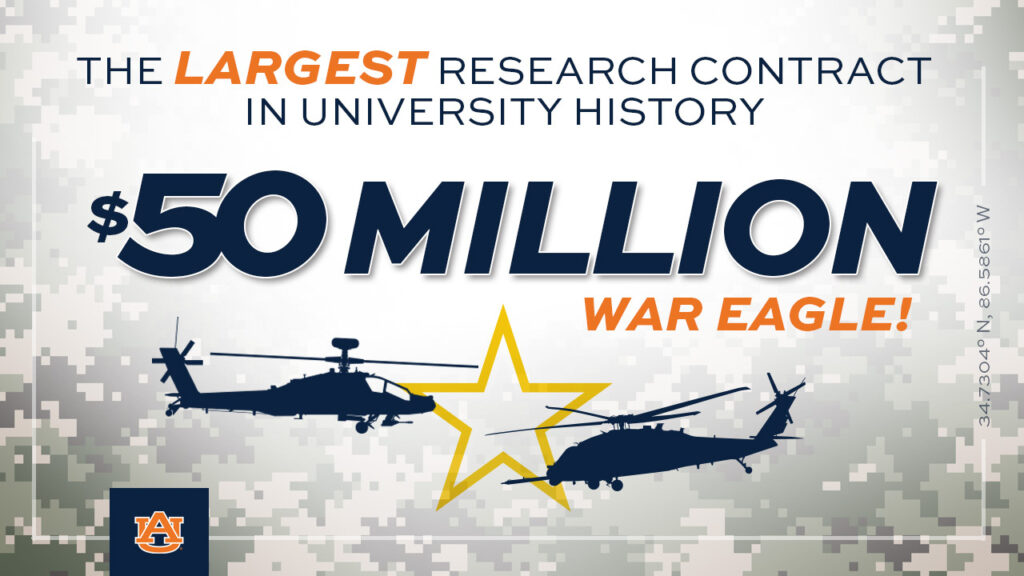Army advanced manufacturing project is the largest research contract in university history
BY AUBURN UNIVERSITY NEWS | BY JEREMY HENDERSON
How much is Auburn University’s advanced manufacturing expertise worth to the U.S. Army? Up to $50 million.
That’s the total of a new three-year project — the single largest prime research contract ever awarded to Auburn University — designed to help the U.S. Army Combat Capabilities Development Command Aviation & Missile Center boost its increasing modernization efforts.
Titled “Lightweight, Advanced Manufacturing of Metallic, Polymer and Composite Structures for Aviation and Missile Weapon Systems,” the project will be facilitated through the Auburn University Applied Research Institute (AUARI) in Huntsville and will rely extensively on research expertise from Auburn’s National Center for Additive Manufacturing Excellence (NCAME), and the Interdisciplinary Center for Advanced Manufacturing Systems (ICAMS).
“Our main objective is to enable the Army to incorporate advanced manufacturing materials and methods into existing and future aviation and missile systems,” said Robert Dowling, AUARI director of research development. “To do that, we’ll develop prototype advanced manufacturing processes required to analyze, design, develop, test, integrate and sustain qualified components for existing and future aviation and missile systems. The advanced manufacturing materials we’re considering include alloys, polymers and composites. The methods will include everything from machine learning to material properties characterization.”
Specific to the latter, $9.3 million of the award has already been designated for NCAME, which will use the funds to continue its industry-leading research into the materials, parts and process qualification necessary for furthering implementation of additive manufacturing in Army operations.
“While existing and future aviation and missile systems will be the direct beneficiaries of the project, successful results may be transferable to other government advanced manufacturing projects,” Dowling said. “A lot of effort has gone into developing this opportunity. We’re excited to get to work.”
Steve Taylor, Auburn University’s senior vice president for research and economic development, agrees.
“It goes without saying, but this is a significant accomplishment for Auburn’s research enterprise and our Applied Research Institute,” Taylor said. “But it also speaks volumes about how our Army partners in Huntsville, and beyond, are placing significant value on Auburn’s work in advanced manufacturing, which is a key research focus area for our Samuel Ginn College of Engineering. To say it’s paying off is an understatement.”
Dowling also calls the project tailor-made for fulfilling one of the AUARI administration’s stated goals — creating a pipeline for real-time engagement between stakeholders in Huntsville’s defense sector and Auburn University’s main campus.
“With this award, we’ve demonstrated the significant opportunities that can be created for faculty and students when we combine our core research expertise with customer proximity and knowledge,” Dowling said. “AUARI’s proximity to Redstone Arsenal and familiarity with Army customers and missions enabled the AUARI team to develop a highly responsive proposal representing a broad spectrum of Auburn’s research capabilities both on-campus and in Huntsville.”
In other words, mission accomplished.
“President Roberts’ vision for Auburn is built around dreaming bigger, being bolder and pushing our research endeavors to the next level,” Taylor said. “This historic award does exactly that.”
